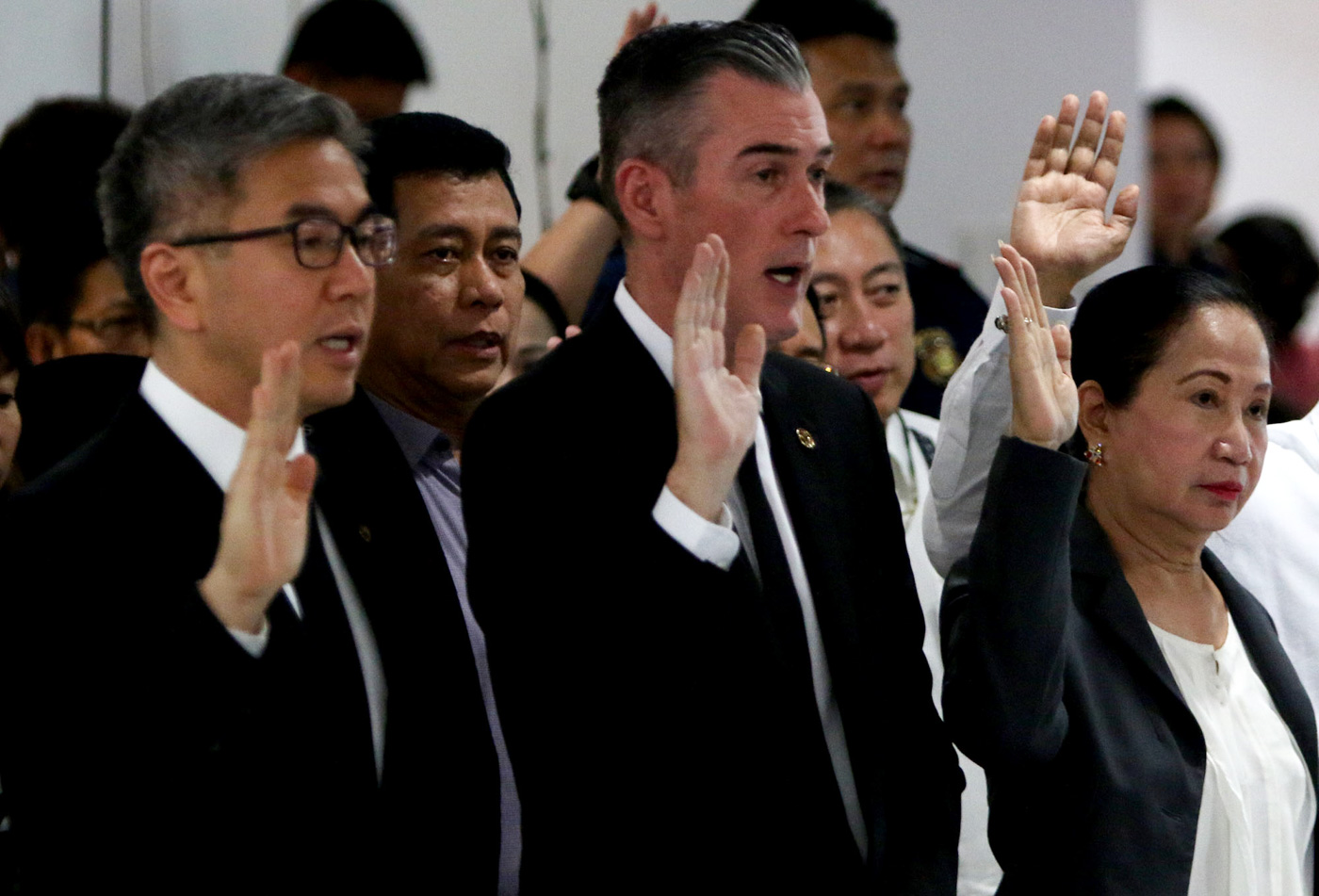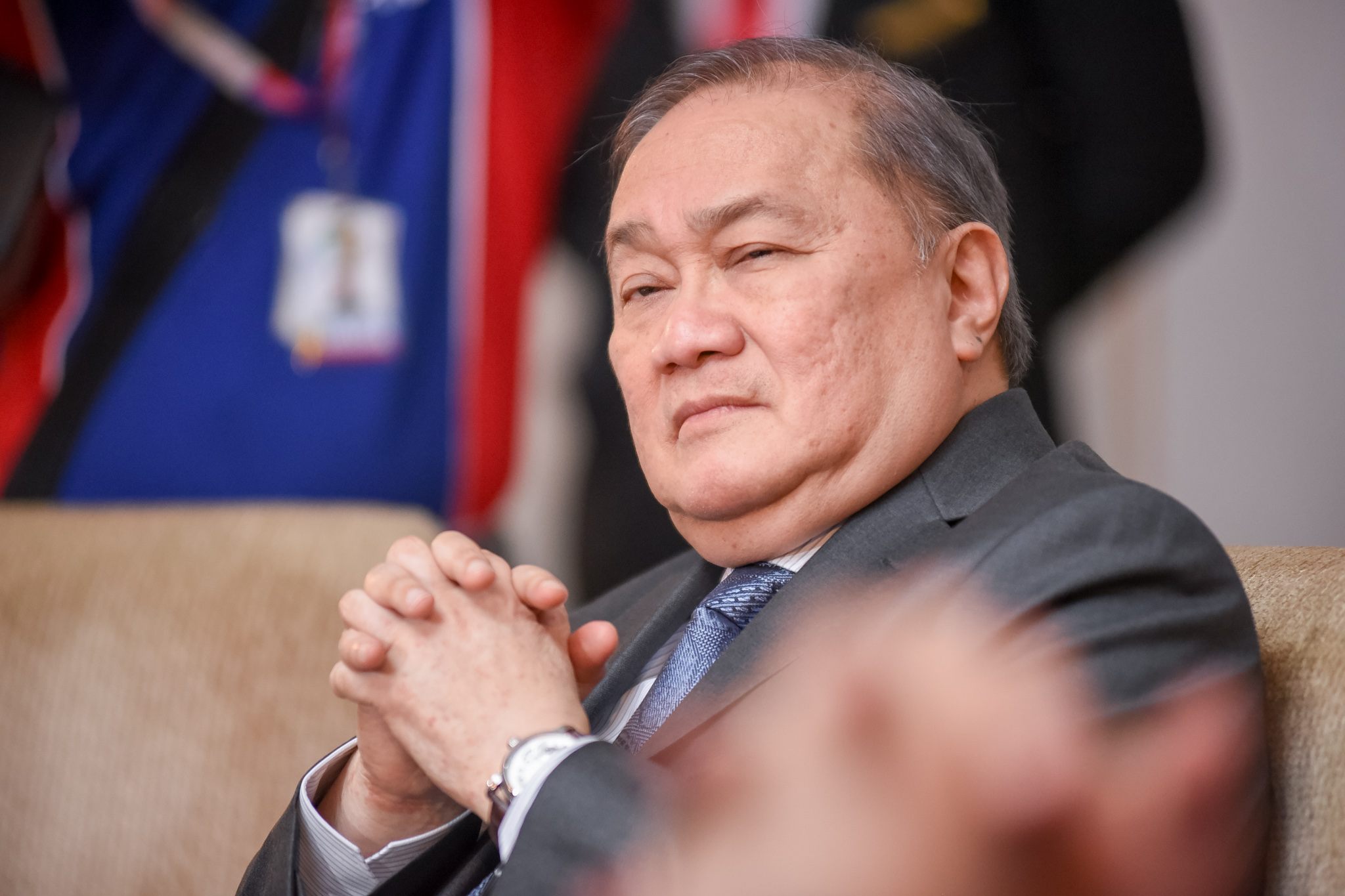![QUIET. Resorts World Manila facade 2 days after the attack. Photo by LeAnne Jazul/Rappler]()
MANILA, Philippines – The fallout continues for business tycoon Andrew Tan’s companies as Travellers International Hotel Group and Alliance Global Group suffered a combined loss of about P15.69 billion in market capitalization. This, a week since a deadly attack on Resorts World Manila (RWM) claimed the lives of 37 people on Friday, June 2.
According to data from the Philippine Stock Exchange (PSE) as of June 9, Travellers International Hotel Group, which operates Resorts World Manila, has lost about P7.09 billion in market capitalization since trading on June 1.
Meanwhile, its parent company, Alliance Global Group, has likewise suffered a loss of about P8.6 billion in market value.
"Everything we're seeing in the share price movement, I would say you'd expect after the incident,” said Luis Limlingan, head of sales and research at Regina Capital Development Corporation.
Prior to the attack, RWM stocks were priced at P3.40 apiece. But as markets closed on Friday, June 9, RWM stocks closed 10.29% lower at P3.05.
![TORCHED. The casino floor at Resorts World Manila after attacks took place past midnight of June 2. Photo sourced by Rappler]()
Casino stocks
Dealing a further blow to RWM are peer companies’ stock performance a week since the attack.
Enrique Razon-led Bloomberry Resorts Corporation, which operates Solaire Resort and Casino, along with Melco Resorts and Entertainment Corporation, which operates City of Dreams Manila, are listed on the Philippine Stock Exchange (PSE).
Together, the two sites are part of RWM’s competition and make for 2 of Manila’s 4 main integrated casino-resort complexes.
While Bloomberry’s and Melco’s stocks plunged in the aftermath of the RWM attack, the two companies proved to be stiff competition for RWM once more, a week after the incident. (READ: Casino stocks plunge ater Resorts World Manila attack)
Before the attack, June 1 stock data reflected a price of P9.85 per share for Bloomberry, which fell to P9.30 on June 2. Melco’s share price also fell to P9.67 on June 2, down 4.26% from its June 1 share price of P10.10.
However, as markets closed on June 9, PSE figures show Bloomberry close at a price of P9.97, even higher than its June 1 share price. Likewise, Melco’s stock performance, while still recovering, has also steadied with a closing price of P9.35 as of June 9.
![]()
The same is yet to been seen with RWM stocks, which fell 7.94% to P3.13 as markets closed the same day of the incident on June 2.
RWM's stocks have barely been able to recover since.
Trading at an average price of P3.0 to P3.05 throughout the week, RWM traded for as low as P2.90 apiece – a stark difference from its initial public offering price of P11.28 per share.
Impact
The declining stock price of RWM has made even more evident the companies’ struggling performance over the last few years, as increasingly tough competition continues to enter the casino market. (READ: FAST FACTS: What you need to know about the Philippine Casino Industry)
Although a first mover in the integrated casino-resort landscape, RWM has slowly been losing its market share in gross gaming revenue (GGR).
{source}
<iframe id="datawrapper-chart-O6LUU" src="//datawrapper.dwcdn.net/O6LUU/4/" scrolling="no" frameborder="0" allowtransparency="true" allowfullscreen="allowfullscreen" webkitallowfullscreen="webkitallowfullscreen" mozallowfullscreen="mozallowfullscreen" oallowfullscreen="oallowfullscreen" msallowfullscreen="msallowfullscreen" width="100%" height="333"></iframe><script type="text/javascript">if("undefined"==typeof window.datawrapper)window.datawrapper={};window.datawrapper["O6LUU"]={},window.datawrapper["O6LUU"].embedDeltas={"100":441,"200":387,"300":360,"400":333,"500":333,"600":333,"700":333,"800":333,"900":333,"1000":333},window.datawrapper["O6LUU"].iframe=document.getElementById("datawrapper-chart-O6LUU"),window.datawrapper["O6LUU"].iframe.style.height=window.datawrapper["O6LUU"].embedDeltas[Math.min(1e3,Math.max(100*Math.floor(window.datawrapper["O6LUU"].iframe.offsetWidth/100),100))]+"px",window.addEventListener("message",function(a){if("undefined"!=typeof a.data["datawrapper-height"])for(var b in a.data["datawrapper-height"])if("O6LUU"==b)window.datawrapper["O6LUU"].iframe.style.height=a.data["datawrapper-height"][b]+"px"});</script>
{/source}
Data from financial services firm Credit Suisse showed a decline in RWM’s 50% market share in 2012 to 19% in 2017, according to the firm’s own projections.
“What is worth noting is that the mass tables and slot machines segments are actually the drivers of this decline,” said Credit Suisse in a 2015 report on the Philippine gaming sector.
The firm stated RWM’s market is most threatened by City of Dreams Manila, which continues to affect RWM’s market share in terms of GGR, because it is attracting a similar target market.
{source}
<iframe id="datawrapper-chart-NahDZ" src="//datawrapper.dwcdn.net/NahDZ/1/" scrolling="no" frameborder="0" allowtransparency="true" allowfullscreen="allowfullscreen" webkitallowfullscreen="webkitallowfullscreen" mozallowfullscreen="mozallowfullscreen" oallowfullscreen="oallowfullscreen" msallowfullscreen="msallowfullscreen" width="100%" height="387"></iframe><script type="text/javascript">if("undefined"==typeof window.datawrapper)window.datawrapper={};window.datawrapper["NahDZ"]={},window.datawrapper["NahDZ"].embedDeltas={"100":539,"200":441,"300":414,"400":414,"500":387,"600":387,"700":387,"800":387,"900":387,"1000":387},window.datawrapper["NahDZ"].iframe=document.getElementById("datawrapper-chart-NahDZ"),window.datawrapper["NahDZ"].iframe.style.height=window.datawrapper["NahDZ"].embedDeltas[Math.min(1e3,Math.max(100*Math.floor(window.datawrapper["NahDZ"].iframe.offsetWidth/100),100))]+"px",window.addEventListener("message",function(a){if("undefined"!=typeof a.data["datawrapper-height"])for(var b in a.data["datawrapper-height"])if("NahDZ"==b)window.datawrapper["NahDZ"].iframe.style.height=a.data["datawrapper-height"][b]+"px"});</script>
{/source}
Figures from the company’s financial disclosures also revealed the company’s declining financial performance in GGR.
The company attributed this to a decline in the volume of visits for both the non-VIP and VIP segments of its business, citing an overall drop of 10.4% in 2016.
Increased competition, highlighted by the recent opening of Okada Manila in Entertainment City, will likewise continue to further challenge RWM’s operations.
“The greater Manila market is showing signs of maturation with Resorts World Manila, the first privately owned resort, showing steep declines amid the ramp-up of the newer resorts, “ said Fitch Ratings, a credit rating agency, in its 2017 Global Gaming Handbook.
Company disclosures illustrated the continued decline in GGR, with the company earning P5,261 billion in the 1st quarter of 2017, about 5.59% lower than its GGR of P5,573 billion in the same period last 2016.
![INVESTIGATION. Resort World Manila President Kingson Sian and Chief Operating Officer Stephen James Reilly and PAGCOR Chairperson Andrea Domingo during the Congressional committee hearing on Resort World Manila incident at the Dignitaries Lounge of NAIA Terminal 3 in Pasay City. Photo by Inoue Jaena/Rappler]()
Uncertainty
Aside from a decline in its financial performance, tougher roads are up ahead for RWM.
The Philippine Amusement and Gaming Corporation (Pagcor) has recently ordered RWM to cease and desist all gaming operations as Pagcor conducts investigations that hope to shed light on the company’s liability. (READ: Pagcor suspends Resorts World Manila gaming license)
Pagcor, in its stament, added the security lapses of RWM “put the Philippine gaming, tourism, and hospitality in bad light.”
The RWM attack, carried out by lone gunman Jessie Carlos, broke out past midnight of June 2 as he fired shots and set ablaze gaming tables in an attempt to steal P113-million worth of casino chips.
Carlos was a former employee of the Department of Finance who was heavily indebted. He was also part of Pagcor's National Database for Restricted Persons since March 2017 after his family filed for exclusion from casinos on his behalf. (READ: Gambling addiction: How the Philippines prevents, handles ‘problem gamers’)
Since then, questions surrounding the recent RWM attack remain unanswered. While investigations continue, RWM’s fate remains in a state of limbo.– Rappler.com
![]()























